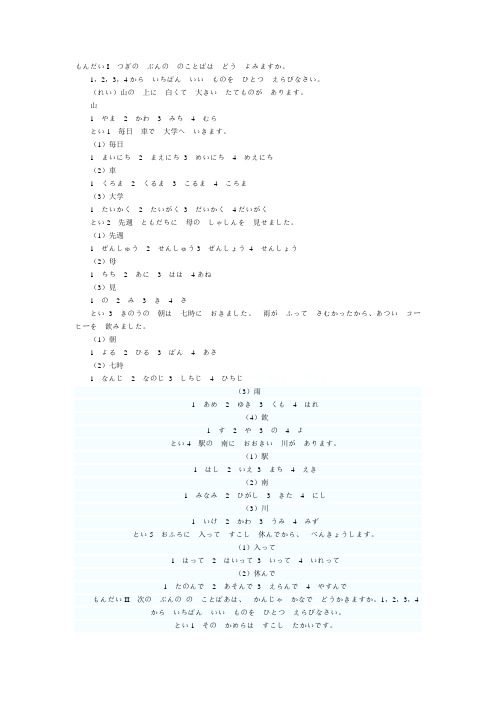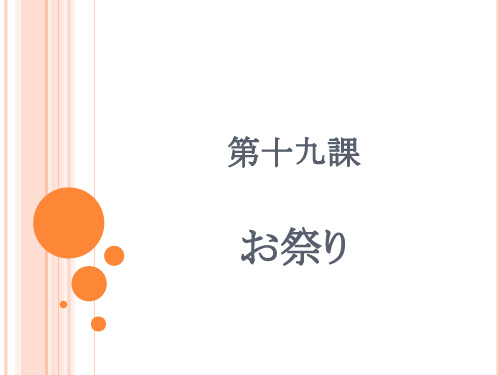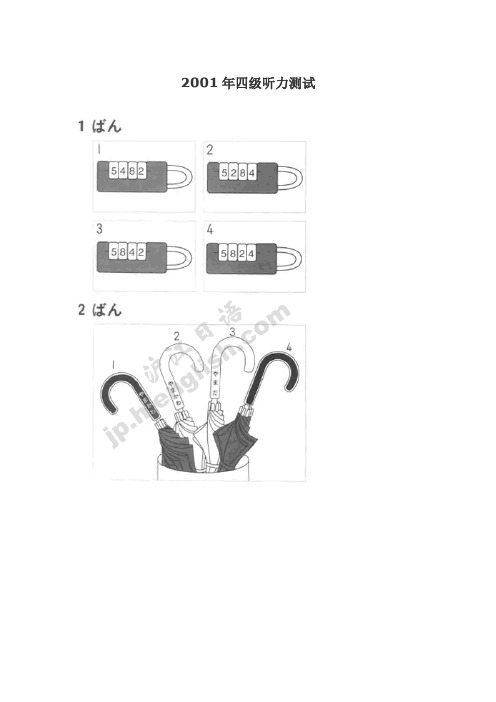2006年日语四级听力真题 附答案和听力原文
日语四级考试

もんだいIつぎのぶんののことばはどうよみますか。
1,2,3,4からいちばんいいものをひとつえらびなさい。
(れい)山の上に白くて大きいたてものがあります。
山1やま2かわ3みち4むらとい1毎日車で大学へいきます。
(1)毎日1まいにち2まえにち3めいにち4めえにち(2)車1くろま2くるま3こるま4ころま(3)大学1たいかく2たいがく3だいかく4だいがくとい2先週ともだちに母のしゃしんを見せました。
(1)先週1ぜんしゅう2せんしゅう3ぜんしょう4せんしょう(2)母1ちち2あに3はは4あね(3)見1の2み3き4さとい3きのうの朝は七時におきました。
雨がふってさむかったから、あついコーヒーを飲みました。
(1)朝1よる2ひる3ばん4あさ(2)七時1なんじ2なのじ3しちじ4ひちじ来源:考试大-小语种考试(3)雨1あめ2ゆき3くも4はれ(4)飲1す2や3の4よとい4駅の南におおきい川があります。
(1)駅1はし2いえ3まち4えき(2)南1みなみ2ひがし3きた4にし(3)川1いけ2かわ3うみ4みずとい5おふろに入ってすこし休んでから、べんきょうします。
(1)入って1はって2はいって3いって4いれって(2)休んで1たのんで2あそんで3えらんで4やすんでもんだいII次のぶんののことばあは、かんじゃかなでどうかきますか。
1,2,3,4からいちばんいいものをひとつえらびなさい。
とい1そのかめらはすこしたかいです。
(1)すこし1示し2小い3少し4不し(2)たかい1長い2高い3多い4安いとい2ドアのみぎにでんきにすいっちがあります。
(1)みぎ1右2石3後4戸(2)でんき1電気2天気3電器4電機(3)すいっち1スイッテ2ネイッテ3スイッチ4ヌイッチとい3いつもここでしんぶんをかいます。
(1)しんぶん1新文2新分3新聞4新本(2)か1員2貿3貸4買とい4らいげつのむいかにともだちがきます。
来源:考试大-小语种考试责编:xyq 评论纠错(1)むいか1 八日2九日3三日4六日(2)き1来2木3気4行もんだいIII次のぶんの()のところになにをいれますか。
日语考级1-4级单词

第三部分---------读解/文法 50分 200点
总计 100分 400点
2).报名时间、考试时间及地点
报名时间:每年5月-6月,关注教育部海外考试中心网站----日本语考试
考试时间;每年12月第一星期日。
あつい(厚い) 厚的
あと(後) 后、后边
あなた 你
あに(兄) 哥哥
あね(姉) 姐姐
あの 那个
あの 嗯
アパート 公寓
あびる「水をあびる」 淋「淋浴」
あぶない(危ない) 危险的
あまい(甘い) 甜的
あまり 不太、不怎么(后接否定)
あめ(雨) 雨
あらう(洗う) 洗涤
第三部分---------读解/文法 90分 200点
总计 180分 400点
2级 总分400点 ,240点得分者合格。(日本语学习600小时左右,中级日语学习完后的水平)
其中:第一部分---------文学/词汇 35分 100点 要掌握较高程度的文法汉字( 1,000字左右),词汇(6,000词左右)
3).领取准考证
考试前两周内的任何一个工作日到所报考点领取准考证。领取准考证时须携带个人有效证件 (仅限于身份证、护照或军官证)和二张小2寸免冠近照。
4).领取成绩单和证书
成绩单和证书约在考试3个月后到达考点。届时请考生与考点电话咨询成绩到达情况。
[编辑本段]考试指南
如何选择日语报考的等级
一般来讲,没有报考日语四级的必要。因为日语四级所考核的内容都是最简单的日语基础文法和单词。而日语三级和四级的水平相差不大,比较接近,而且从四级很容易就可上升到三级,所以报考四级就不如努努力,直接报考三级。三级与二级的差距比较大,而且一般日企如果对日语要求不是很高的话,二级就可以了,并且现在考研的日语也非常接近二级水平,所以报考日语二级是比较有用的,也是每年报考人数最多的。目前在国内报考日语一级的人目标基本上都比较明确,主要以日语专业的大学生为主,另外就是因为工作原因必须考一级的人,总的来讲,报考一级的人也不是特别的多。因此每年的日语等级考试,考二级的人基本上都是最多的,三级和一级的人数接近,四级最少。[1]
日语四级语法汇总59~75

语法★ どんな~ ★ 讲解:用在名词前,询问状态,用形容词和形容动词来回答。
是中文“(怎样)什么样的~”之意。
例句:これはどんな庭園ですか。
古い庭園です。
これはどんな町ですか。
静かな町です。
学习几个表示颜色的词。
白い(しろい):白色的 黒い(くろい):黑色的 赤い(あかい):红色的 青い(あおい):蓝色的 緑(みどり):绿色的 黄色い(きいろい):黄色的练习翻译:1. 那是什么样的车? 是黑色的车。
2. 这是什么样的地方? 是热闹的地方。
3. 请用日语默写出星期一到星期日这7个词,并标注假名和中文翻译。
答案:1. 那是什么样的车? 是黑色的车。
あれはどんな車ですか。
黒い車です。
あれはどんなくるまですか。
くろいくるまです。
2. 这是什么样的地方? 是热闹的地方。
これはどんな地方ですか。
にぎやかな地方です。
これはどんなちほうですか。
にぎやかなちほううです。
3. 请用日语默写出星期一到星期日这7个词,并标注假名和中文翻译。
日曜日(にちようび)星期天 月曜日(げつようび)星期一 火曜日(かようび)星期二 水曜日(すいようび)星期三 木曜日(もくようび)星期四日语四级语法总结金曜日(きんようび)星期五土曜日(どようび)星期六词汇好きだ(すきだ):(形容动词)喜欢,爱好上手だ(じょうずだ):(形容动词)好,擅长コンビニ:便利店(Convenience store)マンション:(高级)公寓(mansion)ホテル:宾馆(hotel)ゲーム:游戏(game)サッカー:足球(soccer)语法★甲は乙が~です★讲解:表示人的好恶或水平高低时,具有这种感情或能力的人(甲)后用“は”。
感情或能力所及的对象(乙)后用“が”。
例句:張さんはピンパンが上手です。
田中さんは絵が好きです。
わたしは野球が好きではありません。
练习翻译:1. 纯子擅长网球。
2. 我喜欢游戏。
3. 我不擅长足球。
答案:1. 纯子擅长网球。
日本语听力第一册 第19课 お祭り 原文及答案

問題Ⅲ スキッとを聞いて、あとの問いに答えなさい。
女:明日は7月17日で、祇園祭ですね。 男:祇園祭というのは、どんな行事
[ぎょうじ]
ですか。 女:それは、疫病 [えきびょう][やくびょう]退 散 [たいさん]のために、いろいろなものを飾 り、無事 [ぶじ]を願う行事ですよ。 男:どこでするんですか。 女:毎年京都でやります。 男:どんなことするんですか。
皆さん、お疲れ様でし た
問題Ⅳ CDを聞いて、文を完成しなさい。
日本には温泉が千か所ぐらいあるそうです。 温泉はいろいろな病気に効果があるので、 人々に親しまれてきました。また、保養施設と して開発が進み、夏ならテニスやゴルフ、冬な らスキーができるようにしたところも少なくありま せん。このごろは気軽に行けるスーパー銭湯 と呼ばれる、入浴施設も増えています。例え ば、滝風呂、薬草(やくそう)風呂などがあり、 食事やマッサージなども利用できて、そこで一 日を過ごすことができるので、人気があります。
2.男性の小包が到着するのにどのくら
いかかりますか。
男:この小包をフランスのパリを送りたいんですが、何日ぐら いかかりますか。 女:EMSで三日、航空便で八日、船便なら6週間かかります? 男:わかりました。それじゃ、航空便にします。
①三日。 ②四日。 ③八日。 ④6週間。
③
3.この男性はどうやって会社に来ました
か。
男:健康のために、昨日から自転車で会社に通うことにしたん だ、でも今朝は雨だったのよ、やめたよ。 女:それじゃ、いつものように車できたの。 男:それが、どうしてもエンジンがかからなくて、バスで来たん だ。
①自転車で来ました。 ②自分の車で来ました。 ③女の人の車で来ました。 ④バスで来ました。
A2000年日语能力考试4级听力原文

2000年日本語能力試験4級聴解原文問題Ⅰ一番女の人と男の人が絵を見ています。
女の人はどの魚の絵が好きですか。
女:ああ、さかなの絵ですね男:ええ、どのいいですか?女:あちらの飛んでいる絵。
男:いいですね、たくさんいてきれいですね。
答え:2二番女の人と男の人が話しています。
どの人の話をしていますか。
男:で、その男はどんな服でしたか。
女:背広を着ていました。
男:じや、ネクタイも?女:いえ、ネクタイはしていませんでした。
男:そうですか。
答え:1三番タクシーの中で、女の人が男の人に話しています。
タクシーはどう行きますか。
女:あのう、あそこに大きな木がありますね。
男:はい。
女:あの木の向こうの道を右に曲がってください。
男:はい、分かりました。
木の向こうを右ですね。
女:ええ、そうです。
答え:2四番女の人が話しています。
練習は、どんな順番でやりますか。
女:今日の練習は。
いろいろあるから、大変ですよ。
はじめに、プールで30分泳いで、それから自転車で1時間、そして公園で30分走ります。
えー、休みはですね、走る前に30分ぐらい休みましょう。
答え:3五番女の人と男の人がカメラダ-を見ながら話しています。
二人はいつ食事に行きますか。
女:来週、会社の後で、一緒に食事に行きませんか。
男:いいですね。
いつがいいですか。
女:月曜か金曜はどうですか。
男:私は三日から五日まで大阪に行きますが・・・・・・女:そうですか。
じゃ。
この日いいですか。
男:はい。
答え:4六番ひらがなを四つ並べています。
どうなりましたか。
女性:あっ、できた!横に読むと「いす」と「年」です。
男性:はい。
女性:上から下に読むと「すし」と「いと」です。
男性:ああ、できましたね。
答え:2七番男の人が話しています。
どの絵が正しいですか。
男性:えー、まず電車ですが、今日一日、里山駅で電車を使った人、乗ったり降りたりした人ですね、えーと、380人です。
バスは290人でした。
2001年日语四级听力真题及听力原文

2001年四级听力测试問題I1番男の人と女の人が話しています。
かぎの番号は何番ですか。
男性:鍵の番号は?女性:5842です。
男性:えっ、5,4,8…。
女性:いいえ、5842です。
◆かぎの番号は何番ですか。
答え:32番男の人と女の人が話しています。
女の人の傘はどれですか。
山川:すみません。
傘を取ってください。
男性:はい。
どれですか。
山川:あのう、私の名前が書いてあります。
男性:ええと、山川さんのは…、2本ありますけど。
山川:白いのです。
◆女の人の傘はどれですか。
答え:23番女の人が話しています。
女の人は、どれがほしいと言っていますか。
女性:すみません。
その大きい箱を取ってください。
片仮名でヤマダと書いてある、その箱です。
◆女の人は、どれがほしいと言っていますか。
答え:14番男の人と女の人が話しています。
花瓶はどう置きますか。
男性:花瓶はどう置きましょうか。
女性:そうですね。
じゃあ、上に一つ置きましょう。
次が二つ、下が三つ。
どうですか。
男性:ん一、あまりよくないですね。
女性:じゃあ、上が三つ、一番下が一つ。
どうですか。
男性:あ、いいですね。
◆花瓶はどう置きますか。
答え:45番男の人と女の人が話しています。
かばんはいくらですか。
女性:すみません。
このかばんください。
店員:はい、18400円です。
毎度ありがとうございます。
◆かばんはいくらでしたか。
答え:26番女の人が話しています。
話しているかばんはどれですか。
女性:かばんの忘れ物です。
どなたのですか?この四角くて、大きい、黒いかばんです。
◆女の人が話しているかばんはどれですか。
答え:37番男の人と女の人が話しています。
男の人はいつ東京に行きますか。
女性:青山さん、いつ東京に行きますか。
青山:金曜日です。
女性:えっ、じゃあ、明日ですか。
青山:いいえ、来週です。
女性:ああ、8日ですか。
◆男の人いつ東京に行きますか。
答え:38番女の人がスポーツの練習について話しています。
06年英语专四听力原文和答案
2006年专四听力答案PART I DICTATIONThe InternetThe Internet is the most significant progress in the field of communication. /lmagine a book that never ends, a library with a million floors ,/or imagine a research project with thousands of scientists /working around the clock forever./This is the magic of the Internet. /Yet the Internet has the potential for good and bad. /0ne can find well-organized information-rich websites./At the same time, one can also find wasteful websites. /Most websites are known as different Internet applications./These include online games, chat rooms and so on./These applications have great power too. /Sometimes the power can be so great /that young people may easily become victims to their attraction. /So we need to recognize the seriousness of the problem. /We must work together to use its power for better ends.PART ⅡLISTENING COMPREHENSIONSECTION A CONVERSATIONSQuestions I to 3 are based on the following conversation.M: Hello.W: Oh, hello, you must be a new student. Did you find us, Ok?M: Well, I got a bit lost and I had to ask a stranger, but I got here eventually.W; Oh, dear. Have you come far today?M; Only from Britain. I was staying with my brother.W: Oh, good. (1) How did you get here?M: (1) My brother took me to the railway station and I got a bus at this end.W: Aha, well, you'd better tell me your name, so I can find your form.M: It 's Mark Bern.W: Bern, Bern. Ah, yes. Oh, you've changed since this photo. (2) What happened to your beard and moustache, and you are not wearing glasses, either?M: No, I thought I'd better look smarter.W: Here is the key to your room. It is 501.M: Thanks. How do I get there?W: Go to the end of this corridor, turn left and it's the third door on the right.M: Thank you. Oh, there is a meeting for new students. What time is that?W: (3) Half past five in the Common Room on the ground floor at the other end of the corridor.M: Thanks a lot. Bye.Key: 1.C 2.A 3.BQuestions 4 to 6 are based on the following conversation.W: Hi, Steve, how are things?M: Hi, Maggie. Good, thanks. What's new with you?W: Oh, I was just wondering if you wanted to go out tonight.M: Well, (4)1 was thinking of going to the university library to do a bit of study. What have you got in mind?W: I thought we could just go for a walk, maybe down to that park near the beach.M: Tonight? (5) You must be joking. It's too cold.W: Oh, yes. It's too cold, but I still want to go out somewhere. That new Tom Cruise's film is on in town. How about that?M: Ok, what time does it start?W: Oh, I think it's half past eight or something. I will just get the paper and have a look. Just turn on for a minute. Look, the film got fantastic review in the paper last week. M: Ok,ok. (6) Where are we going to meet?W: (6)lt'd be easier if we met at the cinema.M: Ok. Where is it?W: Oh, you know, the Olyang.M: Where is that?W: (6) Near the Town Hall and opposite the bank.M: Oh, yeah. I know where it is. Ok, look, I will meet you there at fifteen past eight. Key:4.D 5.B 6.DQuestions 7 to 10 are based on the following conversation.W: What are you reading. Bill?M: It's this week's New Scientist ,whyI .W: I was just wondering. It looks interesting. (9) But I've never actually read it myself. It's for real scientists—or can ordinary people like me understand it?M: Oh, it's for anyone really. It usually has articles and stories about character affairs and about science as well as papers about new development and research. I am reading about new telephone that allows you to see the person you are speaking to as well as hear him.W: Oh,I've heard about it. (7)/(9)ls it on the market yet? Can I buy one?M: No, not this one. (8) But the company has made other models to try out on business. This one is special because its color and the image is moving.W: Oh, that's interesting.M: You see the first video phones that what they called were made in Japan. But they can only show a still, black and white image. So this video phone is much better than that. (8) Mind you and I'm not sure I want one, would you?W: (8) Well, no. I don't think I would. I bet it costs a lot of money. Does it say how much it costs?M: Yes, the early black and white ones cost several hundred pounds, (7) but the one the story is about costs several thousand pounds.W: En. Why does anybody want one, do you think?M: Business organizations that need to frequently contact overseas organizations would want it. (10) It's like a face-to-face conversation. So maybe a lot of overseas travel can be avoided.W: (9) Yes, I suppose so.Key: 7.C 8.C 9.B 10.ASECTION B PASSAGESQuestions II to 13 are based on the following passage.If you're in a western country, you often see people walking their dogs. It is still true that a dog is the most useful animal in the world. (13) However the reason why one keeps the dog has changed. (11) Once upon a time, a man met a dog and wanted it to help him in the fight against other animals. And the dog listened to him and did what he told him to do. Later people used dogs for hunting other animals. And dogs did not eat what they got until their masters agreed. (11) Dogs were also used for driving sheep and guarding chickens. But now people in towns and cities do not need dogs to fight other animals any more. Of course, they keep them to frighten thieves. But the most important reason for keeping dogs is that they feell only in the city. For a child, a dog is his best friend when he has no friends to play with; for a young wife, a dog is her child when she does not have her own; for old people, a dog is also a child when their real children have grown up and left. (12) Now people do not have to use a dog, but they keep it as a friend,just like a member of the family.Key: 11.D 12.A 13.DQuestions 14 to 17 are based on the following passage.I am going to work in a totally new environment. I'll have to get used to different working conditions. I am used to working in quite high-tech sort of industry that has got lots of machinery and everything. But now I am going to a place that(14) has no machinery as such, apart from a typewriter. The place has no electricity at all, no photocopiers,all the things that you just take for granted here. They just won't be there any more. I'll be staying near the school in quite a small village. And (15)1 will be staying in a teacher's house, living with two or three other volunteer teachers. I'll have to get used to not having the variety of different foods that you have here like twenty different varieties of breakfast serial. (16) And the range of food there is much smaller, not many choices. I'll also have to get used to getting water from a well, not having electricity which means gas lamps in the evening; which means the difficulty of preparing for the next day's lessons in poor light; which means different ways of getting your clothes washed. (17) There will be all sorts of big differences like that, but I'll have to get used to when I arrive there.Key: 14.B 15.D 16.A 17.CQuestions 18 to 20 are based on the following passage.The most common type of child abuse you know is beating with the hands or with an instrument usually a cane in some places. Nearly a third of the abused children we see are (18) in the age group between six and ten, and about sixty-five percent of them are boys. (18) This is the age group when children are first to expect to study hard and parents have great expectations of their progresses in school. Boys of course attract more abuse such as beating because (20) once again parental expectations are high, and boys tend to be more energetic and difficult to control than girls. Most experts seem toagree that the child abuse is caused by a combination of social and psychological factors. Families who beat their children are not particularly different from other people. (20) The only difference that exists between them is that they lack skills in the establishing good relationships with their children. These families too .generally speaking, have other problems such as (19) marriage problems or financial problems. Some parents are hurting their children because they strongly believe in the use of traditional discipline methods. But many of them have (19) emotional problems. (20) They are often the victims of violence themselves. Sometimes they even bear an unreasonable hatred for a child because they believe that the child has brought the family bad luck.Key: 18.B 19.A 20.CSECTION C NEW BROADCASTNews Item I(21) American coast guard officials in Florida say they have returned to Cuba a group of would-be migrants who try to (22) make their way to the United States in an unusual vessel, a floating truck. They said one of their planes spotted the Cubans more than halfway through their journey, and the coast guard could not believe their eyes when they saw the vessel. The Cubans had attached floats and propellers to (22) a 1951 shabby truck.Key: 21.D 22.BNews Item 2All large and medium-sized Chinese cities will have greater air quality monitoring by 2010, says a government official. The government has spent 150 million yuan on air quality monitoring systems across China since 2000 when officials began paying greater attention to air quality monitoring. (23) More than 220 cities now have air quality monitoring systems and 42 others will have systems in place by the end of this year.Key:23.DNews Item 3(25) Storms sank two river ferries in southern Bangladesh on Sunday and some (24)90 passengers were reported missing while at least another 68 died. One of the packed ferries carrying around 150 people capsized early on Sunday on the Meghna river and (25)50 were rescued. A second ferry sank on the same river just one kilometer away leaving 40 passengers missing after (25) 6 were rescued.Key:24.B 25.ANews Item 4(26) The Indonesian government has given official approval for an Australian consulate in Dili. The first Australian consulate officials will travel to the East Timor capital next week as well as serving the consular needs of Australian in the region. The consulate will facilitate Australian support to the United Nation's assistance mission inEast Timor. The announcement follows in principle their agreement reached on the opening of the consulate between Australian prime minister and Indonesian president in Barley last month.Key:26.CNews Item 5(27) PepsiCo of the US and Unilever of the UK have become the latest foreign entrance in China's competitive bottle tea market. The two companies launched Lipton's iced tea in Guangzhou last week in a 50-50 venture. (28) “PepsiCo is contributing its bottling facilities and distribution networks to the alliance while Unilever provides the famous tea brand and recipe.”company executive said. China has a growing bottle tea market estimated to be worth 10 billion Yuan. It has been dominated in recent years by two Taiwanese brands .Master Kang and Uni-President. Three other big brands. Nestle, Guangdong based Jianiibao and Lipton, have just entered the market this year. Swiss company Nestle is working in conjunction with Coca Cola.Key:27.A 28.CNews Item 6(29) The Isreali peace camp has launched tfa,e biggest protest in years (30) with more than 100 000 people protesting on Saturday and demanding the country leave Gaza, after Palestinian militants dealt Israel's army its deadliest blow since 2002. Crowds at Tel Aviv's main square added to the growing call for withdrawal from the war-torn territory. (30) The killing of 13 soldiers by militants in the Gaza strict last week has deepened already strong support in Israel for Prime Minister Sharon's Gaza pullout plan which is being delayed by hardliners in his right-wing Likud party.Key: 29.B 30.D。
日语专业四级-2006年日语专业四级真题
日语专业四级-2006年日语专业四级真题1、時間A.しかんB.じがんC.しがんD.じかん2、見られませんA.きられませんB.みいられませんC.みられませんD.きいられません3、一つA.ひとつB.ふだつC.ふたつD.ひどつ4、千円A.せいえんB.せいねんC.せんねんD.せんえん5、父A.すちB.ちぢC.しちD.つち6、目A.てB.あしC.めD.はな7、耳A.くちB.あたまC.みみD.からだ8、水A.くつB.みずC.きってD.くすり9、買ってA.かってB.つくってC.とってD.あらって10、前A.まいB.めえC.めいD.まえ11、立ってA.たってB.すわってC.のってD.とまって12、半分A.はんぷんB.はんぶんC.ほんぶんD.ほんぷん13、聞いてA.きいてB.おいてC.ひらいてD.はたらいて14、古いA.ぬるいB.わるいC.ふるいD.まるい15、電話A.でんきB.でんわC.てんわD.てんき16、がっこうA.学校B.字校C.字枚D.学枚17、やすんだA.体すんだB.体んだC.休すんだD.休んだ18、なんA.同B.何C.向D.伺19、ぱーてぃーA.ベーティーB.バーティーC.パーディーD.パーティー20、あめA.冊B.両C.雨D.再21、いきませんA.行きませんB.仕きませんC.代きませんD.征きません22、かいしゃA.今杜B.会社C.今社D.会杜23、なかA.史B.中C.央D.内24、らいねんA.未年B.未年C.来年D.来年25、ながいA.辰いB.弄いC.兵いD.長い26、わたしはよるシャワーを___。
A.あびますB.とりますC.なきますD.ぬぎます27、ここでたばこを___ぐださい。
A.かけないでB.きえないでC.すわないでD.つかないで28、はじめまして。
どうぞ___。
A.ごめんぐださいB.ごちそうさまC.こんばんはD.よろしく29、たまごは___いりますか。
A.なんこB.なんさつC.なんだいD.なんまい30、あたらしいことばを___。
日语专四
《高校日语专业四级考试大纲》一要求《高校日语专业四级考试大纲》(以下简称大纲)是根据2003年国家教育部发布的《高等院校日语专业基础阶段教学大纲》制定的,考试目的是为了检查各高校日语专业对教学大纲的执行情况,特别是教学大纲规定的四级水平所要达到的综合语言技能和交际能力。
新考纲的题型、题数、计分和考试时间如下:卷别序号题号名称题数计分考试时间(分钟)第一部分一1~20 听力理解20 20二21~30 文字10 10三31~45 词汇15 15四46~60 语法15 15五61~70 完型填空10 10六71~85 阅读理解15 15第二部分七86~95 完成句子10 10八96 作文 1 15合计 96 110 160听力部分1、考试内容A.听懂日本人用标准语以正常语速进行的日常交谈、讲演或报告。
B.能听懂语速为每分钟160~260字的原文听力材料,听一遍后能理解中心大意,抓主要内容和重要情节,并能辨别说话人语气和态度等。
C.能听懂我国电台对日本广播的新闻和文化节目的主要内容。
D.考试时间为30分钟。
2、命题形式A.听力理解为多项选择题,分两个部分,共20题。
B.第一部分的内容为对话,第二部分的内容为报告或陈述。
C.听力部分的每道题后面有10秒左右的间隙,供考生回答问题。
要求从试卷所给的每题4个答案中选取一个最佳答案。
考题只读一遍。
D.具体以2005年试题为例,听力理解部分由听力A 、听力B、两部分组成,题目数量由前几个的25题削减为20题听力A:每题约为4~7句的短会话,共9题:每题约为8~15句的长会话,共6题。
听力B:每题约为5~10句的陈述,共5题。
文字词汇部分1、考试内容对“文字”的测试目标主要是日语汉字的正确读者,对“词汇”的测试目标则比较广泛,包括用言型、副词型、助词型、习惯搭配型等。
2、命题形式本部分为多项选择题,由25道组成,每题有四个选项。
其中汉字的读法有10题,占10分(前5个根据汉字写出读者,后5个为根据读者写出汉字),词汇的用法有15题,占15分。
2006年日语四级考试试题及答案
2006年日语四级考试试题及答案問題Ⅰ___のことばはどうよみますか。
1234からいちばんいいものをえらびなさい。
問1・えいががすきですが、時間がなくて見られません。
(1).時間1.しかん2.じがん3.しがん4.じかん(2).見られません1.きられません2.みいられません3.みられません4.きいられません問2・これは一つ千円です。
(3).一つ1.ひとつ2.ふだつ3.ふたつ4.ひどつ(4).千円1.せいえん2.せいねん3.せんねん4.せんえん問3・父は目も耳もおおきい。
(5).父1.すち2.ちぢ3.しち4.つち(6).目1.て2.あし3.め4.はな(7).耳1.くち2.あたま3.みみ4.からだ問4・水を買っていきます。
(8).水1.くつ2.みず3.きって4.くすり(9).買って1.かって2.つくって3.とって4.あらって問5・ドアの前に立ってください。
(10).前1.まい2.めえ3.めい4.まえ(11).立って1.たって2.すわって3.のって4.とまって問6・まだCDを半分しか聞いていません。
(12).半分1.はんぷん2.はんぶん3.ほんぶん4.ほんぷん(13).聞いて1.きいて2.おいて3.ひらいて4.はたらいて問7・あの古いいえには電話がありません。
(14).古い1.ぬるい2.わるい3.ふるい4.まるい(15).電話1.でんき2.でんわ3.てんわ4.てんき問題Ⅱ__のことばはどうかきますか。
1234からいちばんいいものをひとつえらびなさい。
問1・さとうさんはきょうがっこうをやすんだ。
(16).がっこう1.学校2.字校3.字枚4.学枚(17).やすんだ1.体すんだ2.体んだ3.休すんだ4.休んだ問2・これはなんのばーていーですか。
(18).なん1.同2.何3.向4.伺(19).ぱーてぃー1.ベーティー2.バーティー3.パーディー4.パーティー問3・あめがふっていますからいきません。
(20).あめ1.冊2.両3.雨4.再(21).いきません1.行きません2.仕きません3.代きません4.征きません問4・わたしのかいしゃはあのビルのなかです。
- 1、下载文档前请自行甄别文档内容的完整性,平台不提供额外的编辑、内容补充、找答案等附加服务。
- 2、"仅部分预览"的文档,不可在线预览部分如存在完整性等问题,可反馈申请退款(可完整预览的文档不适用该条件!)。
- 3、如文档侵犯您的权益,请联系客服反馈,我们会尽快为您处理(人工客服工作时间:9:00-18:30)。
2006年日语四级听力1.
2.
3.4.
5.6.
7.8.
9.
2. 无图题
問題I
1番女の人と男の人が話しています。
男の人は来週の日曜日の午後何をしますか。
女:ヤンさんは休みの日はいつも何をしていますか。
男:休みの日は朝から掃除と洗濯をします。
そして、午後は買い物をしたり、映画を見たりします。
女:では、来週の日曜日、いっしょに映画を見に行きませんか。
男:ああ、すみません。
来週の月曜日はテストですから、日曜日の午後はうちで勉強します。
女:そうですか。
◆男の人は来週の日曜日の午後何をしますか。
【正解:2】
2番女の人と男の人が話しています。
女の人の会社は何日から仕事が始まりますか。
女:田中さんの会社は1月何日から仕事ですか。
男:4日まで休みで、5日から仕事です。
女:いいですね。
わたしの会社は火曜日からもう仕事です。
休みは2日までです。
男:そうですか。
◆女の人の会社は何日から仕事が始まりますか。
【正解:2】
3番男の人が話しています。
写真と名前はどうしますか。
男:写真は紙の左に張ってください。
それから、名前は写真の下に書いてください。
◆写真と名前はどうしますか。
【正解:1】
4番男の人と女の人が話しています。
男の人に電話するときは何番を押しますか。
男:田中さんの部屋の番号は何番ですか。
女:811です。
男:ああ、わたしの部屋番号は818です。
困ったときは電話してください。
電話するときは始めに9を押して、それから部屋番号を押してください。
女:わかりました。
どうもありがとうございます。
◆男の人に電話するときは何番を押しますか。
【正解:4】
5番女の人が話しています。
女の人はどれを見て話していますか。
女:ええ、日本人の大人にお風呂にどのぐらい入るか聞きました。
これを見てください。
一番多かったのは毎日お風呂に入ると答えた人でした。
その次に多かっ
たのが二日に一回入ると答えた人で、毎日お風呂に入る人の半分ぐらいでした。
◆女の人はどれを見て話していますか。
【正解:1】
6番女の人と男の人が話しています。
男の人は今何を履いていますか。
今です。
女:あれ?ふんん。
男:えっ?何か。
女:よく見てください。
足。
男:会社まで靴を履いて来ましたよ。
着いてから、スリッパを履きました。
女:スリッパの話じゃありません。
右と左、違う靴下を履いていますよ。
男:あっ。
◆男の人は今何を履いていますか。
【正解:3】
7番女の人が話しています。
野菜はどうなりますか。
女:それでは、作りましょう。
野菜は半分に切ってから、うすく切ってください。
それから、水に入れてください。
◆野菜はどうなりますか。
【正解:3】
8番女の人と男の人が病院で話しています。
男の人の薬はどれですか。
女:この薬は寝る前に飲んでください。
男:はい。
女:大きいのが二つと、小さいのが三つです。
男:はい。
女:全部で五つです。
男:ありがとうございました。
◆男の人の薬はどれですか。
【正解:4】
9番男の人が話しています。
男の人はコーヒーに何を入れますか。
男:わたしは寝る前にコーヒーを飲みます。
砂糖は入れません。
牛乳を入れて、その後少しお酒を入れて飲みます。
おいしいですよ。
◆男の人はコーヒーに何を入れますか。
【正解:3】
問題Ⅱ
1番学生と先生が話しています。
テストはいつですか。
女:先生、テストは明日ですか。
男:いいえ、あさってです。
木曜日ですよ。
女:ええ?先生、あさっては水曜日ですけど。
男:ああ、本当だ。
そうですね。
水曜日ですね。
この日です。
女:はい、わかりました。
◆テストはいつですか。
1.明日の水曜日です。
2.明日の木曜日です。
3.あさっての水曜日です。
4.あさっての木曜日です。
【正解:3】
2番女の人と男の人が話しています。
男の人はデパートで何を買いますか。
女:すみません、リーさん、買い物、お願いします。
男:わかりました。
女:えっと、八百屋で野菜と果物を買ってください。
男:はい。
女:それから、デパートで肉を買ってください。
男:パンはどうしますか。
女:そうですね。
デパートで買ってください。
おいしいパン屋がありますから。
男:はい、わかりました。
じゃ、行ってきます。
◆男の人はデパートで何を買いますか。
1.野菜と果物です。
2.野菜と肉です。
3.パンと果物です。
4.パンと肉です。
【正解:4】
3番男の子が話しています。
この男の子は明日何を持って行きますか。
男:明日は学校のみんなで出かけるんだよ。
勉強しないから、鉛筆もノートも要らないの。
お弁当は忘れないでくださいって、先生が言ってた。
飲み物は向こうにお茶があるから。
◆この男の子は明日何を持って行きますか。
1.鉛筆です。
2.ノートです。
3.お弁当です。
4.お茶です。
【正解:3】
4番女の人と男の人が病院で話しています。
男の人は毎朝どの薬を飲みますか。
女:白いお薬は一日三回、朝、昼、晩のご飯の後に飲んでください。
**いお薬は朝と晩の二回飲んでください。
青いお薬は寝る前に飲んでください。
男:わかりました
◆男の人は毎朝どの薬を飲みますか。
1.白い薬だけです。
2.**い薬だけです。
3.白い薬と**い薬です。
4.白い薬と**い薬と青い薬です。
【正解:3】
5番男の人が話しています。
この町は今どうなりましたか。
男:50年前この町はとてもにぎやかな町でした。
たくさんの人がこの町に来て、仕事をしまし
た。
店も大きな家もたくさんありました。
しかし今、この町はとても静かになりました。
人も少なくなり、多くの店が閉まりました。
若い人はみんなほかの大きな町へ働きに行き、この町は年を取った人しか住まない町になりました。
◆この町は今どうなりましたか。
1.人が多くなりました。
2.店が多くなりました。
3.若い人が少なくなりました。
4.年を取った人が少なくなりました。
【正解:3】
6番男の人が二人で話しています。
今日は何曜日ですか。
男1:映画を見たいんですが、安い日はいつですか。
男2:木曜日ですよ。
男1:じゃあ、明日ですね。
◆今日は何曜日ですか。
1.火曜日です。
2.水曜日です。
3.木曜日です。
4.金曜日です。
【正解:2】
7番女の人が話しています。
この女の人はどんな友達がほしいですか。
女:こんにちは。
幸恵です。
17歳です。
高校2年生です。
好きなことは走ったり、プールで泳いだりすることです。
休みには時々山に登ったりもします。
同じことが好きな女の子と友達になって、一緒にご飯を食べに行ったり、遊びに行ったり、いろいろ話したりしたいです。
男の子はごめんなさい。
それでは、よろしくお願いします。
◆この女の人はどんな友達がほしいですか。
1.スポーツが好きな男の子です。
2.スポーツが好きな女の子です。
3.料理が好きな男の子です。
4.料理が好きな女の子です。
【正解:2】
8番
女の人と男の人が電話で話しています。
明日二人はどこで会いますか。
女:明日、どこで会いましょうか。
男:お昼に、駅の出口で会いましょう。
女:外は寒いですよ。
中のほうが…。
男:では、駅前にある喫茶店はどうですか。
女:そうですね。
そうしましょう。
◆明日二人はどこで会いますか。
1.駅の出口で会います。
2.駅の中で会います。
3.喫茶店の前で会います。
4.喫茶店の中で会います。
【正解:4】。
